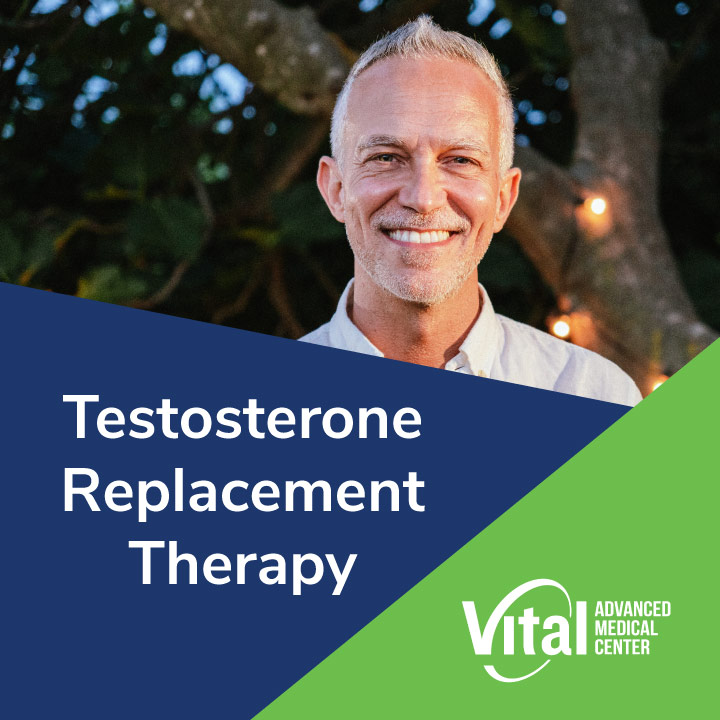As a leading TRT clinic in Tampa, we’ve worked with countless men who have experienced the effects of low testosterone. Testosterone is more than just a hormone associated with masculinity—Testosterone in Men’s Health plays a central role in many aspects of a man’s physical and emotional health.
Understanding how testosterone works in the body can help you identify when something might be off and when to seek help.
What Is Testosterone?
Testosterone is a male sex hormone, or androgen, produced mainly in the testes. While it is most well-known for its role in puberty and sexual development, its influence extends well beyond those functions. Testosterone in men’s health impacts nearly every major system in a man’s body, from muscle development to mood regulation.
Physical Development and Sexual Characteristics
One of testosterone’s primary responsibilities is the development of both primary and secondary male sexual characteristics. During puberty, testosterone drives the growth and maturation of the testes and prostate. It also contributes to the deepening of the voice, growth of facial and body hair, and the development of a more muscular frame.
Even after puberty, testosterone remains vital. It helps maintain these characteristics throughout adulthood and supports overall physical vitality.
Muscle Growth and Bone Health
Testosterone plays a direct role in building and maintaining muscle mass and bone density. It stimulates protein synthesis in the muscles, allowing the body to recover from exercise, build new muscle tissue, and maintain strength. When testosterone levels are low, men may notice muscle weakness, difficulty gaining or maintaining muscle mass, and a greater risk of fractures due to reduced bone density.
At our TRT Tampa clinic, many men come to us feeling weaker than they used to be, often not realizing that their declining muscle strength may be linked to low testosterone.
Fat Distribution and Body Composition
Another important role testosterone plays is in regulating how fat is distributed throughout the body. Higher levels of testosterone typically favor leaner body composition, while low levels can lead to increased body fat, especially around the abdomen. This can have a cascading effect on overall health, as excess abdominal fat is linked to a greater risk of cardiovascular disease and metabolic disorders.
Libido and Sexual Health
Perhaps one of the most noticeable effects of testosterone is on a man’s libido and sexual function. Testosterone fuels sexual desire and helps support erectile function. Men with low testosterone may experience a decline in sex drive, difficulty achieving or maintaining erections, or a general dissatisfaction with their sexual health.
These issues often affect not only personal confidence but also intimate relationships. Many of our patients report that restoring their testosterone levels helped them rebuild stronger, more fulfilling relationships with their partners.
Fertility and Sperm Production
Testosterone is also essential for the production of sperm. Low levels can result in decreased sperm count and may even contribute to infertility. For men trying to conceive, this is an especially important factor to consider when evaluating reproductive health.
Mood and Cognitive Function
Mood changes can be a subtle yet impactful symptom of low testosterone. Many men with low levels report increased irritability, depressive symptoms, or lack of motivation. Testosterone also influences cognitive functions such as memory, focus, and spatial ability. When hormone levels are balanced, mental clarity and emotional well-being often improve.
Energy and Stamina
Feeling constantly tired or lacking endurance? Testosterone could be part of the equation. This hormone helps regulate overall energy levels and physical performance. Men with low testosterone often experience persistent fatigue and reduced stamina, even with adequate sleep and nutrition.
Red Blood Cell Production
Another lesser-known function of testosterone is its role in producing red blood cells. Adequate red blood cell levels are critical for transporting oxygen throughout the body. A deficiency in testosterone can lead to lower red blood cell counts, contributing to fatigue and poor circulation.
Skin, Hair, and Voice
Testosterone also affects the appearance and texture of skin and hair. It is responsible for the thickening of facial and body hair and plays a role in the development of skin tone and texture. During puberty, testosterone causes the voice to deepen by enlarging the larynx and thickening the vocal cords—changes that persist into adulthood.
What to Do If You Suspect Low Testosterone
It’s important to remember that testosterone levels can vary naturally based on age, genetics, and lifestyle factors. However, abnormally low levels—especially when accompanied by symptoms like fatigue, decreased libido, or loss of muscle mass—may signal a need for medical evaluation.
At Vital Advanced Medical Center, our TRT Provider in Tampa specializes in diagnosing and treating low testosterone. Our expert team offers comprehensive evaluations and personalized TRT programs, available both in person and via telehealth consultations.
If you’re experiencing any symptoms of low testosterone or simply want to understand your hormone health better, contact us today to schedule a consultation. We’re here to help you reclaim your strength, energy, and vitality.


